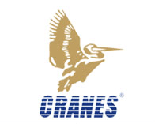Imagine micro air vehicles - aeroplanes the size of butterflies.
Imagine a pathology laboratory on a chip.
Imagine these machines batch-fabricated thousands of times at the cost of a few rupees; where gravity and inertia are no longer important, but the effects of atomic forces and surface sciences dominate.
That is exactly the kind of world Dr.Rudra Pratap and his team have in mind. And those are exactly the kind of vehicles and labs they will eventually make, with the setting up of the CranesSci MEMS Lab - a collaboration between the Indian Institute of Science (IISc), Bangalore, and Cranes Software International Ltd.
With a seed fund of Rs.3 crore, this project will conduct research in MEMS (Micro Electro Mechanical Systems) and develop designs for MEMS based devices.
The lab, to be completed in October, will do the designing and testing, while the fabrication will be done at the government-sponsored MEMS foundry at Chandigarh.
"This is one of the first private sector ventures in research, without any promise of results," Dr.Rudra Pratap, a PhD from Cornell and currently assistant professor in mechanical engineering at the IISc, said, praising Cranes its initiative into research. The team consists of nine people, and three others who are in the pipeline. They will be taken once the lab is ready, Dr.Pratap said.
The lab has a design studio where all the innovation will take place, and a micro dynamics lab. The deal between the IISc and Cranes is that in any project that is not directly funded by another agency, Cranes and IISc will have a 50:50 share in the IPR. "We may also consider giving commercial exploration to a third party," Cranes CEO Asif Khader said.
The lab is currently working on a MEMS software product that will be of great benefit to the student community. "Engineering Colleges today, barring a few top ones, have no access to MEMS software. If we can give them a software design tool, it will lead to enormous manpower generation," Dr.Pratap said.
The lab is also working on MEMS sensors for acoustic applications and ultrasound imaging, besides developing analysis tools and software for engineers working in the area.
The lab drives the mandate of creating IPRs in the area of MEMS.
Those involved in the project besides Cranes and the IISc are the UGC(University Grants Commission) that gave Dr.Pratap the first funding of Rs.70 lakh to go ahead and think of the idea seriously, and the National Program of Smart Materials that has funded a national design centre at the IISc.
"The miniaturisation of mechanical systems and their marriage to electronic systems is what MEMS is all about. Earlier, the relationship was long distance, in MEMS everything sits on the same chip."
But will the continuum hypothesis work in the long run? "We don't know yet. As the scale continues to reduce, we don't know yet if it will work," Dr.Pratap
admitted.
Today, MEMS is talking about a chemical lab, complete with its storage tanks, pipes and motors, on a chip.
It is talking of a chip, no bigger than a grain of pollen, that will beep when you cross your stress threshold.
It is talking of sensors that will tell you the quantity of lead and kinds of bacterial present in the water you drink.
It is talking whatever you can imagine.
|
